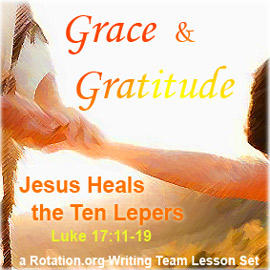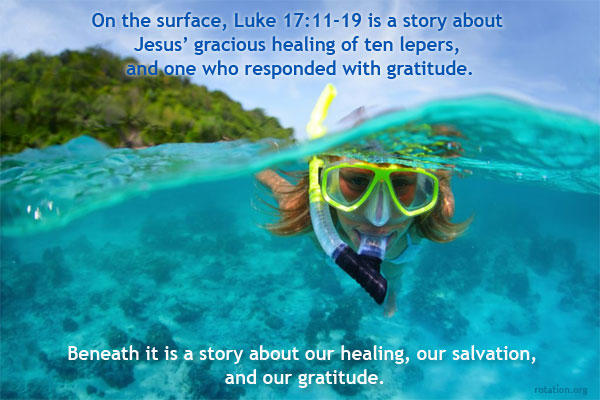Jesus and the Ten Lepers
A Lesson Set from the Rotation.org Writing Team
Bible Background and Lesson Objectives
Scripture for the Set
Luke 17:11-19
11 On the way to Jerusalem Jesus was going through the region between Samaria and Galilee. 12 As he entered a village, ten lepers approached him. Keeping their distance, 13 they called out, saying, “Jesus, Master, have mercy on us!” 14 When he saw them, he said to them, “Go and show yourselves to the priests.”
And as they went, they were made clean. 15 Then one of them, when he saw that he was healed, turned back, praising God with a loud voice. 16 He prostrated himself at Jesus’[c] feet and thanked him. And he was a Samaritan. 17 Then Jesus asked, “Were not ten made clean? But the other nine, where are they? 18 Was none of them found to return and give praise to God except this foreigner?” 19 Then he said to him, “Get up and go on your way; your faith has made you well.” (NRSV)
Learning Objectives for the Set
Students will learn...
- That Jesus cared especially for those whose diseases, disabilities, despair, and doubts left them feeling separated from God and their communities.
- That this story is also a lesson to us about Jesus' amazing saving grace –which seeks to restore us to God and each other.
- That our response to Jesus' grace should be gratitude, and not just the "saying thank you" –kind. That gratitude is a life of grace-giving and healing practiced in the name of Jesus –especially to the lepers among us today, those who struggle and feel unloved.
Bible Background
What's this story about?
It's a simple story....
1. We hope our KIDS will be like that grateful leper and respond to God's Grace.
2. We hope they will recognize to whom they owe their healing, their salvation, and lead a grateful life in response.
But it's also a surprisingly deep story...
Jesus heals all ten lepers without condition, but Jesus recognizes a special blessing, a deeper kind of healing brought about by the leper's gratitude. The words "heal," and "made whole," and "saved" are synonymous in both the Greek and Hebrew. That makes this story a metaphor about Salvation as well.
It's also more than just a story about healing, grace and gratitude.
It's a pointed story about ten outsiders being healed, and "worst" among them, a dreaded Samaritan is made the hero. It's about Jesus sending a message to the religious authorities when he tells the lepers to report to the priests. According to Leviticus, it was the priests' job to declare who was clean and unclean. When Jesus sent them to the priests, he is announcing who HE is to them.
And it's a story that has a big question in the middle of it asked by Jesus...
"Where are the other nine? Were not they healed as well?" It's the kind of question a teacher in a half-empty classroom might ask. It's the kind of question you wonder about when you watch the evening news. "What's wrong with people? Don't they know that ______?" And it's theologically scandalous to boot. All ten were saved by Jesus. Free Grace?
And it's also a story about judging people based on their condition...
Leprosy was a terrible disease which, by the time of Jesus, people were saying was a punishment from God, a sign of sin, something you deserved, a literal living hell. When Jesus simply heals their leprosy without asking about worthiness or faith (he only says, "go see the priests"), Jesus is rejecting what the culture accepted as fact.
Leprosy is a disfiguring and painful disease, and so is bigotry, racism, and whispers about "who deserves what." Leprosy still exists and we have medicines that can prevent it. But the amazing grace of Jesus is still the only answer for a disfigured culture that stigmatizes those in need, and those who are "other."
Grace is ours and gratitude is what we need to complete our healing.
That's the Gospel of Jesus in Luke 17:11-19.
The Setting
The miracle takes place on a road somewhere between Galilee and Samaria. Samaria in the Old Testament was known as "Israel," the northern kingdom (the southern kingdom being called "Judah.") Conquered by the Assyrians and resettled with its soldiers, Jerusalem looked down upon its northern neighbor, and considered its people as something tainted and less than. When they accused Jesus of hanging around with the wrong people, they included his time spent in Samaria. Galilee fared little better. It was considered a backwater tainted by Roman and Greek culture. "Can anything good come out of Nazareth?" they said. Yet, it was along these towns and people that Jesus spent most of his time. One doesn't have to look far in today's world for those who prefer to draw differences over drawing together.
The Salvation Vocabulary of Luke 17:11-19
Compare various Bible translations and you can see an interesting debate over how to tell this story. The Greek word for "healed" in the story, is synonymous with "saved" or "made whole," or "made well." The same is true of these concepts in Hebrew. Being "saved" is being healed, restored, made whole.
This also helps explain Jesus odd comment to an already healed leper that his "faith" had made him whole. Jesus saves us, but there's a response to that grace that begins to create something new in us. When you know and are grateful to the One who has saved you, your soul begins to heal too.
Christian theology classically describes this two-step healing as "Justification and Sanctification." We are justified, "forgiven," "made right" with God through the gracious gift of Jesus upon the cross. It is the unearned, unconditional gift of grace. And that gift begins to transform our soul, our thinking, our response.
Paul said it this way: "For by grace you have been saved through faith, and this is not your own doing; it is the gift of God— not the result of works, so that no one may boast." Ephesians 2:8-9. And in 2 Corinthians 5:17, we learn that this grace leads us to become a "new creation." (For any of you who have been confused by Paul's famous saying in Phil 2:13 to, "work out your own salvation," you now know from Jesus that Paul means work on your response to God's grace, work out your continued healing.)
It's deep, but simple:
Be the grateful leper.
Recognize who Jesus is
and respond with gratitude to what God has done for you.
Believe and you will truly begin living a healed and healing life.
And the nine?
God is patient. He's the waiting father,
...the shepherd out looking for the lost,
the Savior on the cross forgiving them, and rising for them,
so that someday, every leper's knee will bow and tongue confess
that Jesus Christ is their Lord too.
(Click to enlarge)
Copyright 2017, Rotation.org Inc.
Written for the Writing Team by Rev. Neil MacQueen

 Luke's chapter 17 story of Jesus healing the ten lepers --but only one returning to give thanks, is a wonderful sign to us of God's unconditional grace, and the grateful response we should give in return. It's also a story about those who are judged and excluded based on the world's assumptions about their worthiness. Supporting Members can view the creative lesson plans. Everyone can view the lesson summaries and Bible Background.
Luke's chapter 17 story of Jesus healing the ten lepers --but only one returning to give thanks, is a wonderful sign to us of God's unconditional grace, and the grateful response we should give in return. It's also a story about those who are judged and excluded based on the world's assumptions about their worthiness. Supporting Members can view the creative lesson plans. Everyone can view the lesson summaries and Bible Background.






